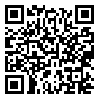Accepted Articles
Back to the articles list |
Back to browse issues page
Fariba Khodagholi1 
 , Maryam Alsadat Mousavi *1
, Maryam Alsadat Mousavi *1 
 , Yahya Ghaedi2
, Yahya Ghaedi2 
 , Shakiba Salarvandian3
, Shakiba Salarvandian3 
 , Fatemeh Vosoughian1
, Fatemeh Vosoughian1 
 , Mobina Javadi3
, Mobina Javadi3 
 , Fereshteh Khodagholi3
, Fereshteh Khodagholi3 
 , Solmaz Khalifeh4
, Solmaz Khalifeh4 
 , Roohollah Karimi5
, Roohollah Karimi5 
 , Masoud Seddighfar1
, Masoud Seddighfar1 
 , Shima Barzin3
, Shima Barzin3 
 , Leila Dargahi1
, Leila Dargahi1 


 , Maryam Alsadat Mousavi *1
, Maryam Alsadat Mousavi *1 
 , Yahya Ghaedi2
, Yahya Ghaedi2 
 , Shakiba Salarvandian3
, Shakiba Salarvandian3 
 , Fatemeh Vosoughian1
, Fatemeh Vosoughian1 
 , Mobina Javadi3
, Mobina Javadi3 
 , Fereshteh Khodagholi3
, Fereshteh Khodagholi3 
 , Solmaz Khalifeh4
, Solmaz Khalifeh4 
 , Roohollah Karimi5
, Roohollah Karimi5 
 , Masoud Seddighfar1
, Masoud Seddighfar1 
 , Shima Barzin3
, Shima Barzin3 
 , Leila Dargahi1
, Leila Dargahi1 

1- Neuroscience Research Center, Shahid Beheshti University of Medical Sciences, Tehran, Iran.
2- Department of Educational Philosophy, Kharazmi University, Tehran, Iran.
3- Neurobiology Research Center, Shahid Beheshti University of Medical Sciences, Tehran, Iran.
4- Cognitive and Neuroscience Research Center (CNRC), Amiralmomenin Hospital, Tehran Medical Sciences, Islamic Azad University, Tehran, Iran.
5- Institute for Humanities and Cultural Studies, Ethics and Training, Tehran, Iran.
2- Department of Educational Philosophy, Kharazmi University, Tehran, Iran.
3- Neurobiology Research Center, Shahid Beheshti University of Medical Sciences, Tehran, Iran.
4- Cognitive and Neuroscience Research Center (CNRC), Amiralmomenin Hospital, Tehran Medical Sciences, Islamic Azad University, Tehran, Iran.
5- Institute for Humanities and Cultural Studies, Ethics and Training, Tehran, Iran.
Abstract:
Among all educational methods all around the world, Philosophy for Children (P4C) has been introduced as one of the effective methods, with various educational, cognitive, and emotional advantages for children. This method is built on three types of thinking; critical (logic), caring (ethical), and creative (aesthetic). The focus of this study is to review the various outcomes of applying this strategy in different genders, ages, and socioeconomic statuses from a neuroscience standpoint. It seems that gender and socioeconomic status can affect the results of this educational method just in some measured aspects. However, the combination of gender, age, and socioeconomic status appears to influence P4C outcomes.
Keywords: Philosophy for Children, Neuroscience, Brain regions, Gender, Age, Socioeconomic status
| Rights and permissions | |
 |
This work is licensed under a Creative Commons Attribution-NonCommercial 4.0 International License. |


